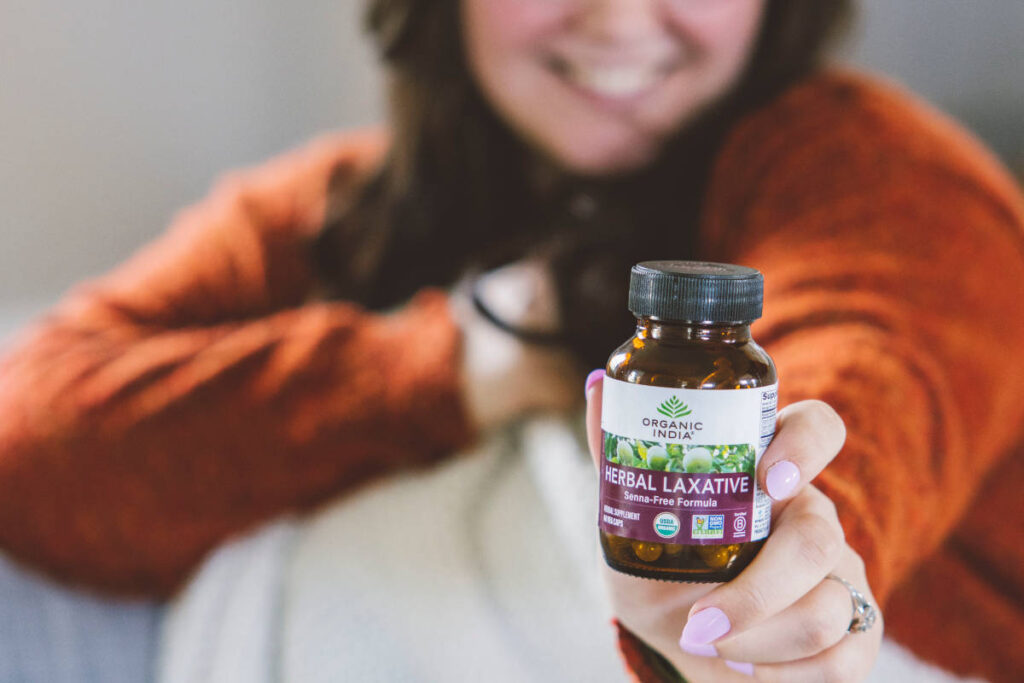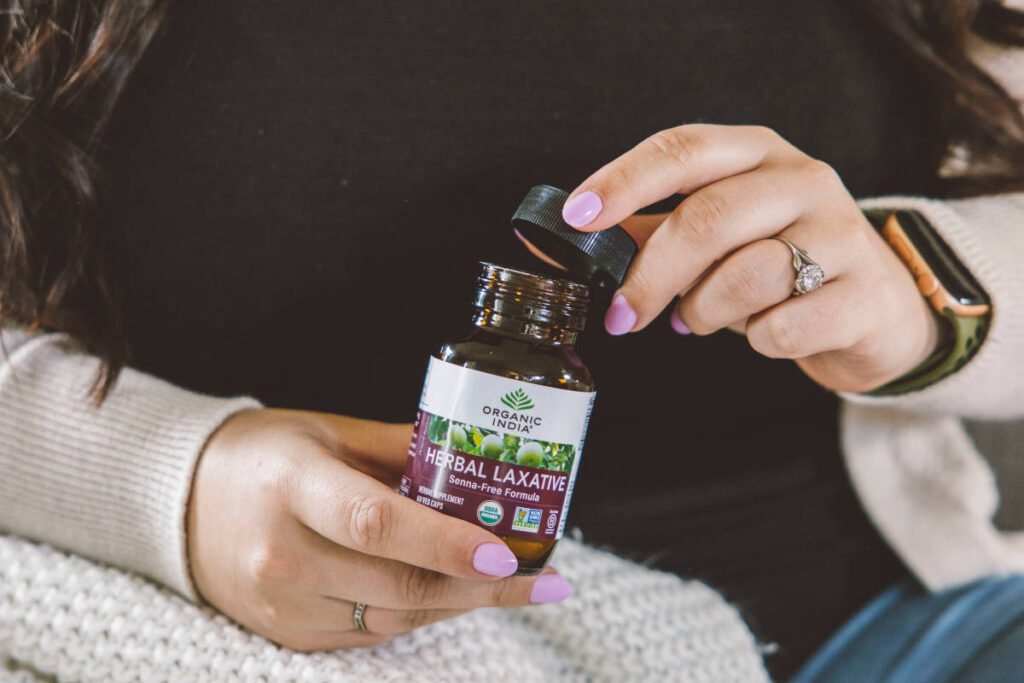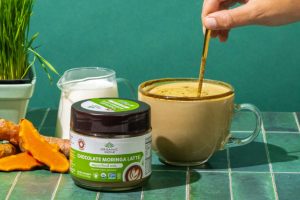

Section

Back
Senna is a popular herb for occasional constipation and is found in many over-the-counter supplements and teas.
Unfortunately, the side effects of senna may outweigh the benefits for some people.
Validating the old saying that “just because it’s natural doesn’t mean it’s safe.”
In this article, you’ll learn about the side effects of senna plus a safer herbal alternative, so you can make the best choice for you.
What is Senna?
Senna is an herb commonly used as a natural alternative to synthetic laxatives.
It’s been used in traditional wellness and modern medical systems and is readily available over the counter as a tincture, in capsules, or in single or blended herbal teas.
It works by irritating or stimulating the intestines to produce a bowel movement.
Senna is also used to prepare patients for colonoscopies and rectal surgeries or to ease painful bowel movements resulting from anal fissures or hemorrhoids.

6 Potential Side Effects of Senna
Senna is effective in addressing irregularity and bowel elimination issues.
However, it comes with various potential side effects for short- or long-term use.
1. Stomach Discomfort*
Senna can cause a variety of stomach discomforts, including
- Cramps
- Bloating
- And general stomach upset.
These symptoms may not occur in everyone and may depend on the dose.
2. Intense Laxative Action*
Part of the reason senna is a popular herbal laxative is it works…sometimes too well.
Due to its stimulative nature, senna can cause an intense laxative effect, which may lead to an uncomfortable or even painful experience.
This experience can be even worse for children or those with gut health issues.

3. Abdominal Pain*
If you’re experiencing constipation, chances are you’re also experiencing abdominal discomfort.
Unfortunately, senna’s stimulating effect on the intestinal tract can cause more discomfort, including cramping and gas pains.
Yes, it will eventually lead to a bowel movement. Still, it may be an unnecessarily painful process.
4. Can Be Habit-Forming*
If the root cause of occasional constipation or irregularity is not addressed (gut and liver health), it can return.
This can lead to dependence or the habit of relying on stimulant laxatives, like senna, to address irregularity.
This is problematic because natural or synthetic stimulant laxatives can create lazy or sluggish bowels, in which your bowels stop performing their optimal function.
In contrast, fiber-rich foods and herbs do not generate dependence because they work with the body’s natural elimination system vs. forcing a result.
5. Diarrhea Inducing*
Overdoses of senna (using more than the recommended amount over a set time) may cause gripping and severe diarrhea with a loss of fluids and electrolytes.
Some research has shown that senna can produce diarrhea in breastfed infants if ingested by the mother. However, other studies did not find the same result.
A gentle laxative should never cause this type of harsh side effect.

6. Unsafe for Long-Term Use*
Long-term consequences of senna use may result in
- Lazy bowel
- Dependency
- Gut health issues due to constant irritation/stimulation of the gut lining
This is why senna is typically only recommended for short-term use.
*Printed source for Senna Herbal Monograph provided at the end of the article.
Herbal Laxative: A Better Herbal Alternative For Occasional Constipation and Bowel Health
Senna may be one of the best-known herbs for relieving occasional constipation, but it’s not the only effective herb for the job.
There are many effective herbal alternatives for occasional constipation that:
- Alternatives will not cause unwanted side effects,
- do not irritate the gut lining,
- and can even support overall intestinal health.
Organic India offers Herbal Laxative, an Ayurvedic, synergistic, tri-herbal, senna-free formula.
This classic formula of organic herbs works as a gentle, non-stimulant laxative that is non-habit forming and safe for daily or long-term use to relieve occasional constipation and promote healthy bowel movements and regularity.
It also contains specific herbs that support digestion, which is critical for regularity and gut health.
Wondering how it works? Let’s break down the formula herb-by-herb.

Bael Leaf: Ayurveda’s premier herb to support healthy stool
Not everyone likes to talk about stool, but healthy stool is essential to proper (and comfortable) elimination and detoxification of harmful toxins and pathogens.
It’s also a direct reflection of how our digestive system in functioning.
So, what exactly is a “healthy stool”?
It depends on who you ask. But, according to Ayurveda, healthy stool generally:
- Is soft but not too soft. It should be soft enough to pass without discomfort but not so soft that it’s watery.
- Comes in the morning (ideally) or at least once per day.
- Floats vs. sinks.
- Comes out mostly together vs. in pieces, although this can vary from dosha types.
- Does not contain visible foods. Food fragments in stool indicate poor digestion and/or food sensitivities.
- Should not smell offensive. Healthy stool won’t smell like roses because it’s a waste product, but it shouldn’t be ultra-smelly or offensive.
The Bael tree is considered a sacred plant in Indian cultures and is regarded as one of the most useful plants in traditional Ayurveda.
Its leaves and fruits have been traditionally used for over 5000 years to support various aspects of well-being, including digestion and elimination.
Bael Leaf is especially helpful for supporting healthy stool because it acts as a natural stool softener by drawing water into the bowels (vs. irritating them) and creating a gentle laxative effect.
- Bael Leaf is a useful laxative and can also help with watery stool.
- Bael possesses properties that support normal bacterial balance and the health of the immune, respiratory, liver, and cardiovascular systems.
- Bale supports normal inflammatory response in the bowels.
In summary, Bael Leaf provides multi-dimensional support for bowel and intestinal health.
Chandrashoor: Garden Cress
Chandrashoor is the seeds of the Garden Cress plant, an annual herb in the mustard family.
In traditional Ayurveda, the entire plant is crushed and used to make infusions for various nutritional benefits and ailments.
Regarding bowel health and occasional constipation, chandrashoor contains a healthy source of dietary fiber and essential fatty acids that help add bulk and elasticity to stool.
It’s also been shown to have a laxative and prokinetic (supports movement) effect in animal studies, although more research is needed to confirm this effect in humans.
Chandrashoor is also used to balance Vata dosha in the stomach and intestines.
Psyllium Husk: Nature’s Stool Bulker
Psyllium Husk is well-known for its ability to add bulk to stool, which helps support healthy elimination and stool formation.
Research has shown Psyllium provides a one-two punch for digestive and bowel health because it is an excellent source of soluble and insoluble prebiotic fiber.
Soluble and insoluble fiber are essential for proper elimination and digestive health.
However, it is the insoluble fiber in Psyllium that creates a gel-like effect in the intestines when combined with water, which creates soft stool that easily exits the bowel.
Prebiotic fiber resists fermentation in the intestines and thus feeds healthy gut microbiota. This results in better digestion, elimination, and overall microbiome diversity and health.
Psyllium has also been shown to support normal cholesterol levels, glycemic control, and inflammatory response of the bowels.

See ya, Senna! Start Experiencing Better Bowel Health Today
As previously mentioned, just because senna is popular doesn’t mean it’s necessarily the best choice for occasional constipation.
Given the significant role proper digestion and elimination play in our ability to detoxify, digest food, assimilate nutrients and support whole health, the products we use for bowel support matter.
This is why Ayurvedic practitioners have turned to the herbs in our Herbal Laxative for thousands of years.
They work to support healthy digestion and elimination in the short- and long-term without irritating the precious gut lining or causing other unwanted side effects.
To learn more, check out our Herbal Laxative Product page, and say “see ya” to senna.
*Gardner, Zoë, and Michael McGuffin. American Herbal Products Association’s Botanical Safety Handbook, Second Edition. Abingdon, United Kingdom, Taylor and Francis, 2013. Senna Monograph p. 805






